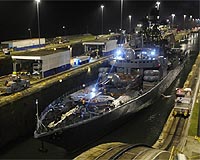| . |  |
. |
Moscow (AFP) Dec 21, 2009 Nikolai Makarov, Russia's influential armed forces chief of staff, said Monday the Russian military and its foreign counterparts needed to remove mistrust to cooperate against common threats. Speaking to over a hundred uniformed foreign military attaches, he said that cooperation should move from exchange of delegations to more sophisticated forms like training personnel. "There comes an understanding that there is a need for you and us to act more openly," he said, noting that a recent flurry of meetings with his colleagues from Germany, Poland, Switzerland, France and the United States reinforced this understanding. "The more we will know each other, the more doors we will open... the more we will trust each other," he said in his end-of-the-year speech to the foreign attaches. But Makarov, who is also first deputy defense minister, cautioned that there still remained a certain level of mistrust between the Russian and foreign military. "A little wall of sorts is still remaining," he said, noting that it prevented better cooperation in fighting common threats like nuclear proliferation and terrorism. "We need to remove this wall so that there are normal relations not only between the states but also between armies," he told his audience at the Academy of the General Staff whose halls are adorned with portraits of Russia's most-famous military commanders, including Stalin. Makarov said Russia never planned to use its vast nuclear arsenals first and would launch a nuclear strike only if it faced an "immediate threat of liquidation of the state system." Speaking of Russia's controversial efforts to reform its bloated outdated army, Makarov said a key problem was changing the Soviet-era mentality of the Russian soldiers. "Our officers were trained in the Soviet Union," he said in response to a question from Captain Garry Newton, a British naval attache. Another key challenge, Makarov said, was that the military equipment produced domestically was not up to Western standards. "The most complicated task is providing (the army) with new equipment and weapons," he said. Makarov, a proponent of modernising the country's conventional armed forces through procurement from Western suppliers, earlier this year admitted the military needs equipment that Russia cannot produce at present, and said the country could buy a Mistral-class helicopter-carrying assault warship from NATO-member France. The deal, which would also include a license to produce several more warships in Russia, would be unprecedented since World War II, both in terms of the size of the equipment in question and Moscow's insistance since the war on producing all military hardware for its own use and export. Share This Article With Planet Earth
Related Links Learn about the Superpowers of the 21st Century at SpaceWar.com Learn about nuclear weapons doctrine and defense at SpaceWar.com
 20 years later, Panamians reflect on US invasion
20 years later, Panamians reflect on US invasionPanama City (AFP) Dec 20, 2009 Twenty years after the United States invaded Panama and captured dictator Manuel Noriega, many Panamanians say the intervention was a US move to remove a "hindrance" to its political agenda. The United States maintains that the invasion, which began on the morning of December 20, 1989 under US president George H.W. Bush, sought to depose general Noriega to bring him to justice for his role ... read more |
|
| The content herein, unless otherwise known to be public domain, are Copyright 1995-2009 - SpaceDaily. AFP and UPI Wire Stories are copyright Agence France-Presse and United Press International. ESA Portal Reports are copyright European Space Agency. All NASA sourced material is public domain. Additional copyrights may apply in whole or part to other bona fide parties. Advertising does not imply endorsement,agreement or approval of any opinions, statements or information provided by SpaceDaily on any Web page published or hosted by SpaceDaily. Privacy Statement |